Dealer Management System (DMS) vs Importer Management System (IMS)

What could ensure seamless collaboration within this business triangle of OEM, Importer, and Dealers?
Today I want to take a closer look into the automotive software industry and its consumer target groups, key players, and parties involved.
We can identify Original Equipment Manufacturers (OEM), Dealers (+Dealer Groups), Car Insurance, Fleet and Car Rental, and a dozen other legal entities active in our rapidly transforming segment. AND there is one member uniquely positioned between OEM and Dealers in the whole industry chain. Their performance is crucial for seamless cooperation in the everyday automotive business. We will discuss Importers, their roles, and functional requirements for software solutions, plus I plan to focus on what could ensure seamless collaboration within this business triangle of OEM, Importer, and Dealers.
The importer business has its own specific needs and complexity. The importer stands between the OEM and the dealer in getting vehicles or parts produced in a particular place to the hands of a customer, possibly thousands of miles away.
The dealers rely on importers to serve their customers at the highest standards, from vehicle sales and delivery to warranty management, not forgetting parts and service.
The OEM counts on the importer as the intermediate between them and an often-considerable number of dealers for these same business areas. However, it will also rely on market data the importer will provide to make strategic decisions and forecast their business.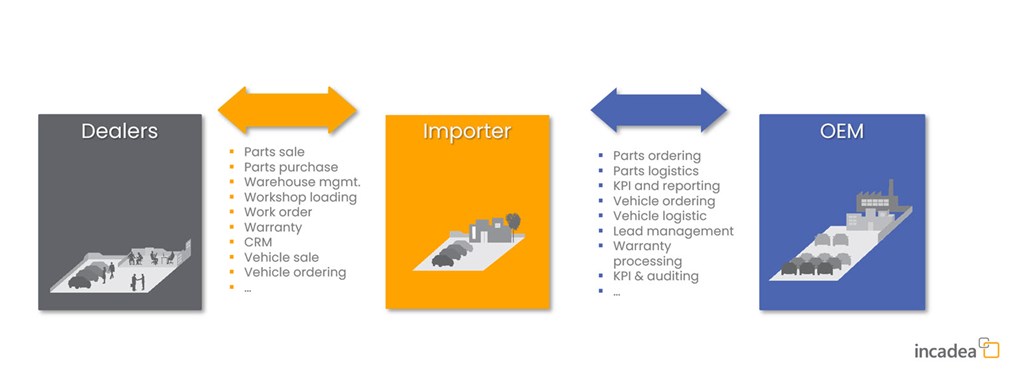 “Let’s cover some software terminology used for it now. In the same way, we call software to manage dealer business activities Dealer Management System (DMS), we can name importer applications Importer Management Systems (IMS). Because dealers in some markets must take the role of importers, this could prompt us to ask the following question:
“Let’s cover some software terminology used for it now. In the same way, we call software to manage dealer business activities Dealer Management System (DMS), we can name importer applications Importer Management Systems (IMS). Because dealers in some markets must take the role of importers, this could prompt us to ask the following question:
Is there an actual difference between DMS and IMS applications?
To answer such questions, one must understand the importer’s primary task. The importer has a unique position between the dealers and the manufacturer (OEM) and is at the center of getting vehicles and parts produced by the OEM to the end customers. So, excellent collaboration with a dealer network and OEM means effective relationships, communication, and inventory management. Importers need the right software tools, modules, and functionalities to effectively coordinate those business operations in IMS.
There is a difference in functional requirements between dealer and importer applications due to the additional role they must take as importers. AND if the importer is a dealer, we can extend the standard dealer management system's functionality to cover the importers' needs. Importer Management Solution becomes an extension (module) of the Dealer Management System, but not vice versa. Besides standard DMS functionalities like Inventory Management, Accounting, and Reporting, one may identify other areas in the schema below related to IMMs.
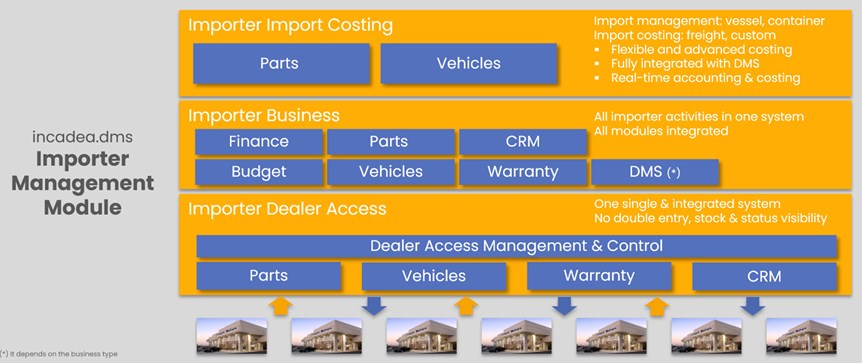
So, let’s focus on IMS (IMM) specific processes, modules, and functionalities.
Vehicle and Parts Ordering Management enables the importer to manage the vehicles and parts inventory, including those in the pipeline, from a central place. The focus must be on automated processes, updates, and data consistency to plan orders efficiently. Access to the vehicle stock list, including ordered, importer, and unsold dealer stock, will, on the one hand, optimize vehicle inventory inquiries and, on the other, provide transparency in ordering, tracking, and dispatching. Supporting eBusiness transactions within the business triangle, automatic status and notifications are must-have software attributes.
Sales Budget & Quotas functionality supports creating flexible sales models or parts budgets with sales quotas (rules) to make the planning process more detailed, transparent, and under control. Therefore, potential delays or unpredicted situations can be communicated early. Sales budgets are shared as a forecast for the factory (OEM). The sales quota functionality may limit the dealers' ability to place further orders if required.
Import Costing Management must cover highly complex scenarios from import management of vessels and containers to customs and freight costing in real-time for a contingent of parts and vehicles. Import costs are also known as shipping, landing, and additional costs like freight, duty, wharf charges, customs, internal freight, tariffs, documentation charges, and any associated internal company costs.
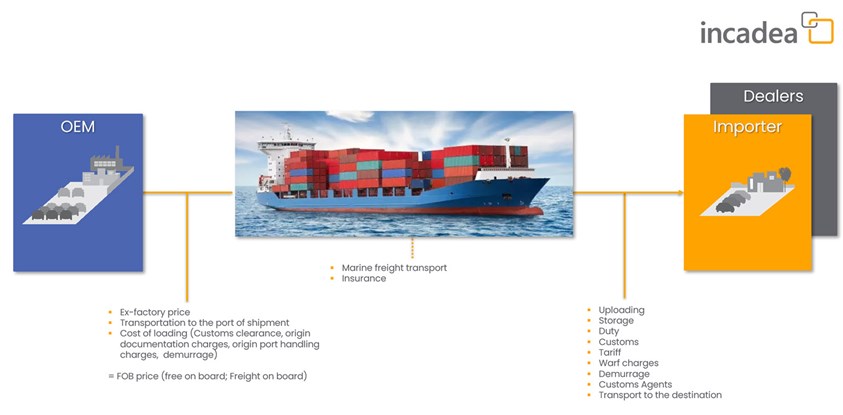
The primary role of Import Costing Management is to oversee the costs of transport of goods and import costing in shipments and assist in compiling all shipment details and contents. It will secure the correctness of import costs calculation and establish an option to forecast cost budgets (planned vs. actual) with an audit trail and visibility of cost details.
Dealer Claim Management must support standard, additional warranty, and service contract processes for all dealer and factory claim types with effective payment management. The claim process must be managed brand (make) independently to ensure OEM-specific rules are in place. Dealers can place warranty and service contract claims in the Dealer Portal. The importer must register, validate, and approve (or reject) claims submitted by dealers. Once the credit memo from OEM is received, the importer can apply the credit to the open account of the dealers. Dealer Claim Management must provide automated payment management from the importer to the dealers. This single process must be manageable for all claim process types (warranty, service contracts, third-party, goodwill) with the electronic exchange of business transactions.
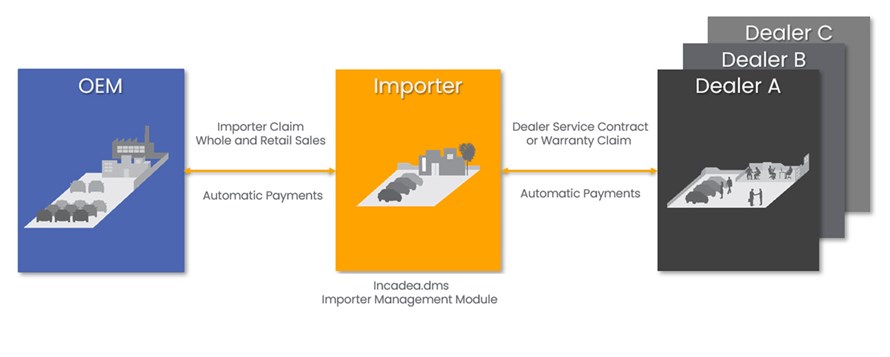 The Dealer Management facilitates the comprehensive management of business transactions between importers and their dealer networks with a flexible integration platform and complete control of dealer access and its business activities. There are two options for accomplishing it: direct access to IMS with all settings related to it or using the Dealer Online Portal platform and integrating it with IMS resp. DMS.
The Dealer Management facilitates the comprehensive management of business transactions between importers and their dealer networks with a flexible integration platform and complete control of dealer access and its business activities. There are two options for accomplishing it: direct access to IMS with all settings related to it or using the Dealer Online Portal platform and integrating it with IMS resp. DMS.
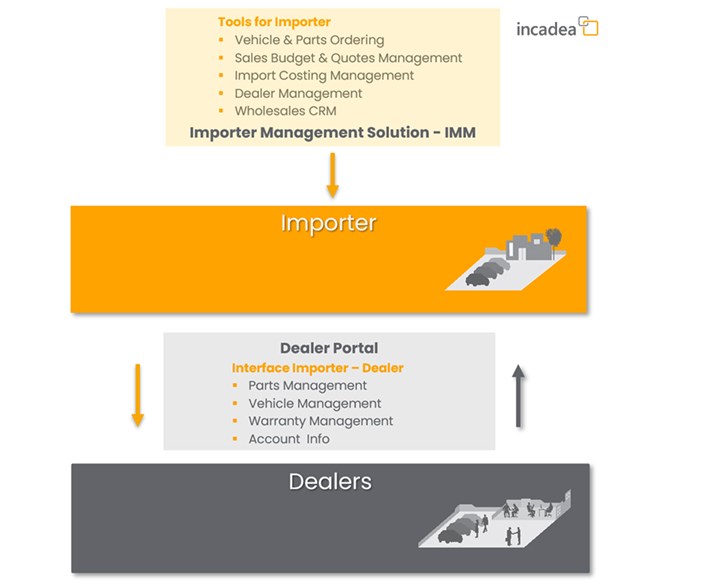
Dealer Management must guarantee online/real-time 24x7 access to the importer's database providing real-time parts or vehicle information and ordering with Electronic Data Interchange Management (EDI).
Excellent cooperation between the importer and dealers is essential to driving more prospects into the dealerships and boosting dealer network profitability. Wholesales CRM must streamline collaboration between dealers and the importer via automated customer (prospect) data transfer while keeping the data quality high and synced.
Wholesales CRM supports the importer in carrying out their marketing activities and campaigns accurately and efficiently (either for dealers or retail customers), encouraging the importer to help dealers, for example, during market launching new vehicle model lines, etc.
The last functional area in the context of a large pool of IMS functionalities today belongs to OEM Integrations. Each car brand has business rules, processes, and interfaces, continuously improving, adapting, and scaling to follow new digital trends. To succeed, IMS must contain concepts highly adaptable in handling multi-brand rules to effectively meet diverse OEM functional requirements without regularly changing the core part. IMS Master Data and Data Exchange modules with a standardized integration platform will ensure seamless system and interface integrations with OEM applications, Dealers, and third-party systems.
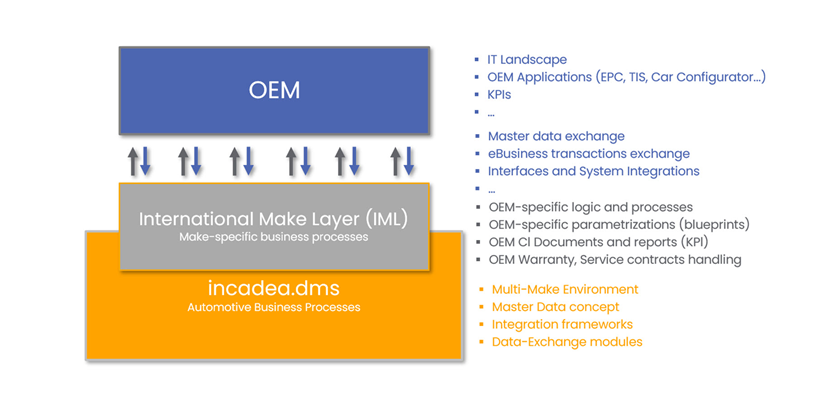
This is all for now related to IMS functionalities. I hope you understand from my article, what matters for IMS, and ensure good cooperation among the business triangle of OEM, Importer, and Dealers. I look forward to your feedback and am genuinely interested in your opinion.
Suppose you want to look at details how incadea.dms handle Importer Management Solution (IMM) check out our homepage for detailed information.
Dr. Juraj Hanus
SME DMS | juraj.hanus@incadea.com